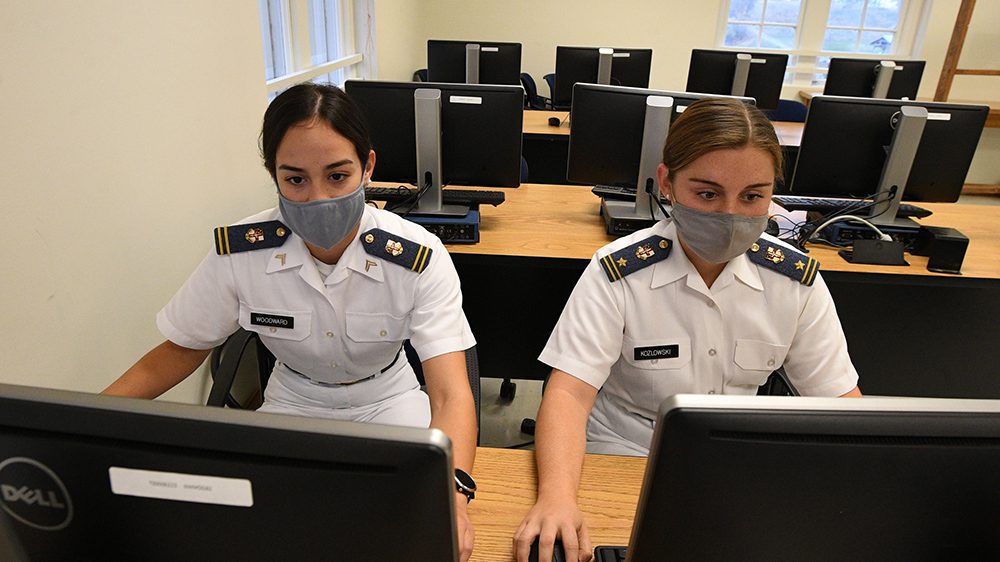Psychology Cadets Study Veterans’ Mental Health

Lexi Woodward ’22 and Erin Kozlowski ’22 conduct research on the mental health of combat veterans. VMI Photo by Kelly Nye.

Lexi Woodward ’22 and Erin Kozlowski ’22 conduct research on the mental health of combat veterans. VMI Photo by Kelly Nye.
Two cadets majoring in psychology are studying data collected about combat veterans, with the goal of understanding how post-traumatic stress disorder, post-traumatic growth, and depressive symptoms correlate with location of deployment, branch of military service, and quality of leadership.
Guided by Maj. Michael LaRocca, Ph.D., assistant professor of psychology, Cadets Erin Kozlowski ’22 and Lexi Woodward ’22 began their independent study earlier this semester, using data on 130 veterans that LaRocca had collected while in graduate school at the University of Alabama.
A U.S. Military Academy graduate whose service in the U.S. Army included a combat deployment to Iraq in 2005, LaRocca found himself drawn to working with veterans in graduate school, with a special interest in how leadership affected their experiences. The veterans he interviewed came from all branches of the service and all the recent conflicts abroad with U.S. involvement.
“There’s so much rich data in there that there’s opportunities for cadets here to explore how leadership correlates with psychological well-being,” LaRocca stated.
In late October, Kozlowski and Woodward presented their research at the Mid-Atlantic Regional Conference of Undergraduate Scholarship, which was held online due to the coronavirus pandemic.
“I’m very glad that Lexi and I had the opportunity to present at the MARCUS conference because it was my first virtual conference, and it was rewarding to see our hard work come together to create an interesting and relevant poster,” Kozlowski wrote in an email.
Woodward also felt that the presentation was a valuable learning experience.
“This experience was incredibly eye opening because it allowed us to see exactly the kind of effort and time that it takes to put together a conference presentation on research,” she commented. Woodward added that the experience was also beneficial because both she and Kozlowski are interested in graduate study in psychology, and presenting research findings is part of work toward a master’s or doctorate in the field.
The PowerPoint the two cadets created showcased many of their findings so far, including the fact that Army and Navy service members were more likely to have combat experience than service members from other branches. Another finding correlated branch of service with post-deployment mental health.
“We found significant correlation between the Army and Navy in terms of combat experience and post-traumatic growth,” said Woodward. “Members of the Air Force were more likely to experience feelings of hopelessness and sadness.”
LaRocca, though, was quick to stress that no one should draw any broad conclusions about branch of service and mental health based on this research alone, as his data was drawn from a limited sample size.
“The findings are preliminary,” he stated. “We can’t make any causal conclusions. We have to interpret with caution.”
Besides, there’s much yet to explore in this data set. “The strongest findings are things like how less effective leadership was associated with post-deployment symptoms,” said LaRocca, who has already published two papers on his findings from the data set. In the spring semester, Kozlowski and Woodward plan to delve more deeply into how the various subscales, or characteristics, of leadership influence followers’ mental health post-deployment.
LaRocca, meanwhile, finds that his interest in the impact of quality leadership dovetails nicely with a class he’s currently teaching, Leadership in Organizations. With cadets in that class, he likes to draw from his experiences as a cadet at West Point, and also as an officer in the Army.
“Leaders shape the self-concept and the well-being of followers,” he commented. “Leaders have a tremendous responsibility to be not only tactically proficient, but also psychologically minded.”
As they pore over the data, Kozlowski and Woodward are likewise aware that their work might help prevent problems down the road.
“We hope that our research could influence the military to help with mental health for their veterans—enhance the awareness of it,” said Kozlowski.